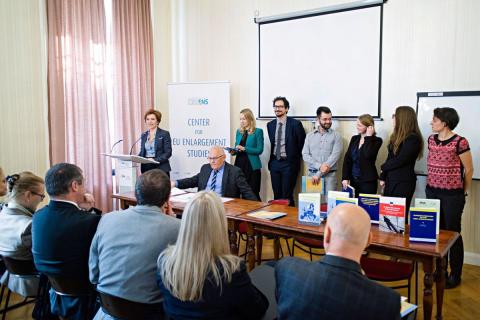After ten years “CENS still makes sense,” says Director Péter Balázs

Founded by Professor Péter Balázs in 2005, the Center for EU Enlargement Studies at the Central European University celebrates its 10th anniversary in 2015. On October 26, 2015, colleagues and partners joined together to celebrate the first decade and to hear about CENS’s plans for the upcoming years.
In his anniversary speech Professor Péter Balázs, director of the Center, highlighted that while the context it operates in has changed over time, the Center plans to maintain its focus on the four main geographic areas which were defined in 2005: 1) the Visegrad 4 countries and Romania, 2) the Western Balkans as the next potential dimension of EU enlargement, 3) Turkey as a long standing candidate and a strategic partner and 4) the eastern neighbors including the EU’s Eastern Partnership program and Russia, another strategic neighbor.
While no new accession is in sight in the near future, even if negotiations with Serbia, Montenegro and Turkey are in course, post-accession conditionality and the quality of new democracies are emerging issues in several EU member states that have entered the Union in the last wave, and these matters have entered the research topics of CENS as well. Furthermore the Ukrainian crisis exploded around conflicts of an EU association agreement. The Center has covered the developments since the start of the Maidan protests already through 12 events organized at CEU, and continues to engage in research on the EU’s Eastern Partnership project and the consolidation problems of the post-Soviet partner countries. Finally, it is clear today that Turkey is not only a strategic neighbor of the EU but in the current context also rises on the agenda as a key transit point for refugees coming from areas of unrest and warfare and targeting core EU countries as asylum seekers.
All the above developments suggest that the original blend of EU Enlargement Studies has changed its color and brightness with time, and CENS has also adapted to this change with thematic adjustments and incorporating new areas of inquiry into its research agenda. Nevertheless, the political and geographical area where CENS’s activities are enrooted is extremely important for world politics, and there will surely be sufficient food for thought for the next 10 years. All in all, “CENS still makes sense,” concluded Balázs.
On top of monitoring and analyzing current developments in its usual areas of inquiry, in the coming year, CENS is going to focus on the topic of post-accession conditionality and democratization in broader Central and Eastern Europe, also looking into democratic transition on the level of societies, it will participate in the development of communication strategies of accession and association for the Western Balkan and Eastern Partnership countries respectively, will strengthen its Russian profile and will conduct research into the issue of migration and its implications on the European Union.
